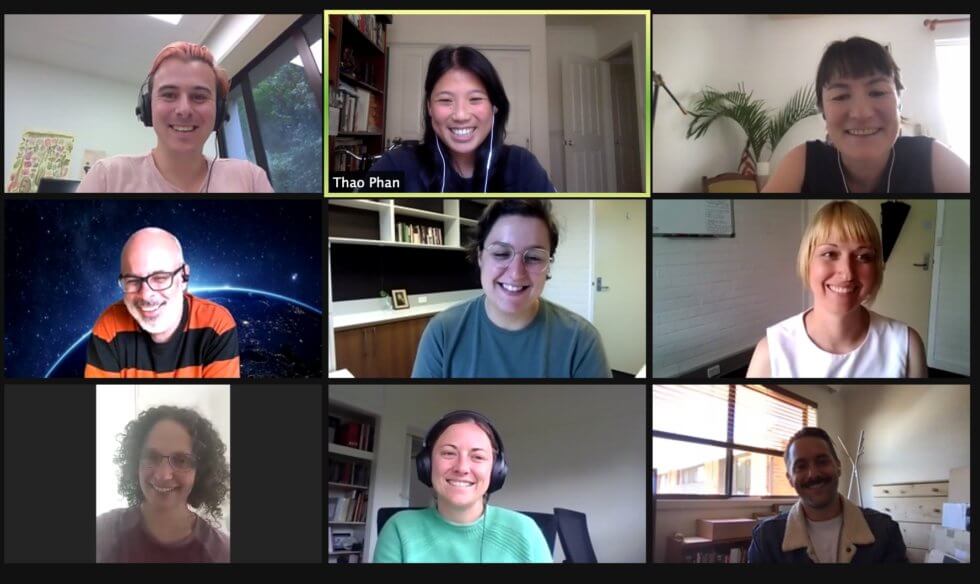
STS Infrastructure Award 2021: AusSTS Graduate Network
On behalf of the Society for Social Studies of Science and the Infrastructure Award Committee, we are delighted to inform you that the AusSTS Graduate Network (AusSTS) has been awarded the 4S Infrastructure for 2021.
The committee members recognize AusSTS that reaches across universities and disciplines. A regional network, it presents a multidimensional infrastructure by organizing and funding STS activities in Australia. In particular, AusSTS has a mission to form a distinct voice from the South and contains a clear intergenerational and mentoring dimension which is crucial for STS community building.
2021 Infrastructure Prize Committee: Wen-Hua Kuo (chair), Bryn Elizabeth Seabrook, Vivette García Deister, Michelle Murphy
Acceptance statement
On behalf of the AusSTS community, we are absolutely delighted and honoured to accept the 2021 STS Infrastructure Award.
The AusSTS Graduate Network (or AusSTS) is a community for STS scholars situated across Australasia. Despite the strong history of STS research in Australia and Aotearoa New Zealand, and the growing recognition of the value and excellence of STS scholarship in the region, it is rare to find dedicated or exclusively defined STS departments or institutes in the universities of either countries. As such, AusSTS was founded to serve as an intellectual and collegial home for STS researchers in Australasia. While the lack of institutional recognition for STS has been an ongoing challenge for researchers, it has conversely meant that the AusSTS community has had the opportunity to grow beyond traditional institutional silos. The network is now defined by its diversity and openness, its support of creative and experimental scholarship, and its commitment to inclusivity. The network’s members are not defined by formal membership or enrollment but rather by a shared desire to nurture community and scholarship at home and in our region.
Since the network was conceived in 2017, we have had the pleasure of counting among our collective a number of talented and generous STS scholars. In particular, we wish to acknowledge and thank the contributions of those who have organised our events and workshops over the years: Thao Phan, Emma Kowal, Timothy Neale, Barbara Bok, Kari Lancaster, Declan Kuch, Courtney Addison, Gemma Smart, Michaela Spencer, Kirsty Howey, Jennifer Macdonald, Cathy Bow, Jocelyn Bosse, Lydia Schofield, and Owen McNamara. We also wish to thank the many generous scholars who have given your time and expertise to our students: Helen Verran, David Turnbull, Karen Barad, Cordelia Fine, Anne Pollock, Jack Halberstam, Matthew Kearnes, Celia Roberts, Adrian Mackenzie, Jenny Kennedy, Emily van der Nagel, Andrea Ballestero, Tess Lea, and more.
This network could not exist without the financial support of institutions and organisations across the country including, Deakin University, University of New South Wales, University of Sydney, Charles Darwin University, the Australian National University, the Australasian Association for the History, Philosophy, and Social Studies of Science, and the National Committee for History and Philosophy of Science at the Australian Academy of Science. This support has been instrumental to not just our own success but to the success of our sister networks in Darwin, TopEndSTS, and in Sydney, STS at UNSW.
We are grateful to have our work in growing the STS community across Australasia recognised in this way by the 4S organisation and look forward to (eventually) celebrating together!
Thao Phan, AusSTS Co-founder and Convenor, on behalf of the AusSTS community
Bio
The AusSTS Graduate Network (or AusSTS) is a community for STS scholars situated across Australasia. The network was established in 2017 in Melbourne, Australia and has since grown to include members from across the Australian continent and Aotearoa New Zealand. It is now an invaluable infrastructural resource for STS scholars in this region. The network hosts regular events and activities designed to bring together the Australasian STS community, support postgraduate and early career scholars, and to reflect on the nuances of situated knowledge-making.
2025: Digital STS
2024: Engaging Science, Technology, and Society (ESTS)
2023: Administrative and Editorial Pillars
2022: Administrative and Editorial Pillars of the Society and Field
2020: Catalyst: Feminism, Theory, Technoscience
2018: East Asian Science, Technology and Society: an International Journal (EASTS)
2017: Editors of the Handbooks of Science and Technology Studies
2016: WTMC (Netherlands Graduate Research School of Science, Technology and Modern Culture)

